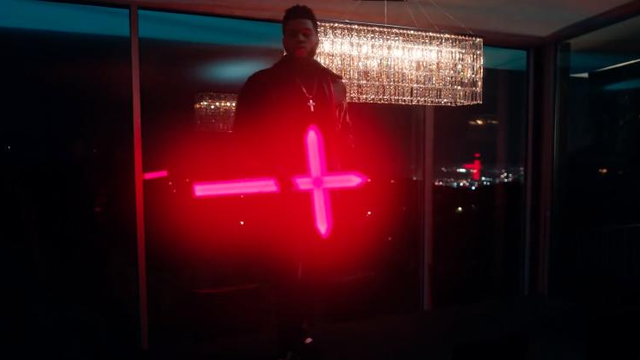


1 album debut on the Billboard 200 this week, Starboy is a twin peak of popularity and confidence that perhaps explains the continued absence of Drake, a fellow Toronto superstar and once pivotal plot point in the Weeknd’s ascent who’s now an obscured early collaborator and ironically his only serious rival on the Billboard charts. If the Weeknd’s old “Dirty Diana” cover and the more recent “In the Night” were designed to approximate the heavier, overwrought stretch of his hero MJ’s emotional range, then “I Feel It Coming,” the Weeknd’s second single featuring Daft Punk, is his appropriation of Michael’s lighter side the song simply could not exist without Off the Wall and “Human Nature.” Starboy is chock-full of capable dance tracks (“Rockin’,” “Secrets,” “Love to Lay,” “A Lonely Night”) from a coke-Goth introvert with two left feet. On Starboy, the Weeknd has finally fully succumbed to the workshop pop forces that gradually reconfigured him ever since “Love Me Harder” in 2014. Beauty Behind the Madness strived for such variety, but the result was jagged and, at turns, unpleasant purely rhythmic hits such as “Can’t Feel My Face” and “The Hills” were interspersed with the swaggerless ballroom exercise “Earned It” and quasi-experimental backwash such as “Losers.” This was the problem with his debut, Kiss Land, too: an abundance of hookless self-indulgence that alienated die-hard fans while earning few new ones. (It will surprise no one to learn that the Weeknd’s formative influence is Michael Jackson’s Off the Wall.) The album’s credits are a mess of capable producers - Daft Punk, Max Martin, Diplo, Frank Dukes, Ben Billions, and then several more - who together have engineered a work of startling cohesion.

Starboy is a brilliant batch of dance records that blends contemporary, post-trap R&B styling with pulses of disco and bubblesoul. So the Weeknd’s songs are more revealing than anything else.
#The weekend starboy dirty full
He’s done very little to cultivate a full and active celebrity profile for himself, quite possibly because he’s smart enough to realize that a certain level of fame is where the work-to-play ratio takes a sharp turn for the worse. But in Apple Music commercials, the Weeknd turns into Alessia Cara, sulking through the club, sitting mum and alone, thumbing his phone. In his songs, the Weeknd is a fiend and a monster. The Weeknd has rendered his mystique - and his personal myths - entirely through music, with only the occasional interview to flesh out certain biographical details.

But we’re not exactly talking about Chris or Bobby Brown here he’s not a tabloid hound or a public mess of a human being. The Weeknd spends much of Starboy demanding to be taken seriously, reminding us that he used to be an NC-17 artist. On “Reminder,” the Weeknd sings, “Goddamn, bitch, I am not a Teen Choice.” But Fox begs to differ. Now, he lives above ground, a mainstay of the Top 10. His last album - 2015’s Beauty Behind the Madness, a triple-platinum breakout for the once notoriously reclusive Toronto singer - spawned five singles, three of which were massive hits, and all of them reimagining the aesthetic constraints, not to mention the commercial breadth, of the Weeknd’s appeal. Starboy, the album, dropped Friday, the culmination of what these days feels like a remarkably transparent and orderly album rollout a rare instance of a major pop star dropping music on cue, without distressing delay. 3 on the Billboard Hot 100, is now the third-highest charting song of the Weeknd’s career. Despite successful reinvention, some people never really change. Some people get off on that sort of thing. For the Weeknd - old and new Abels alike - death is ecstatic. New Abel ties old Abel to a chair and then draws a plastic bag over his head old Abel gasps, kicks, writhes, and expires. When new Abel (with short hair) kills old Abel (with towering dreadlocks) in the prelude to the “Starboy” video, he doesn’t just shoot or stab him. It’s morbid imagery from a grim singer whose uncanny evolution from dreary, dizzying songs about deathly excess to massive dance records for the pop marketplace still defies belief, given how little he’s changed in the way of themes and tone. In “Mania,” the music video for a medley of songs from the album, the Weeknd knifes a man to death, splattering pints of blood across white bathroom walls. The “False Alarm” video features a bank heist, a kidnapping, and a close-quarters shootout. The video for the album’s title single stages a burglary following a murder. Each of the Weeknd’s music videos for Starboy depicts violence.


 0 kommentar(er)
0 kommentar(er)
